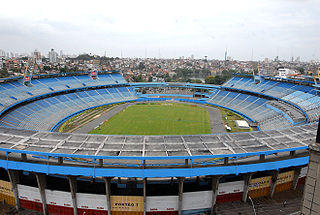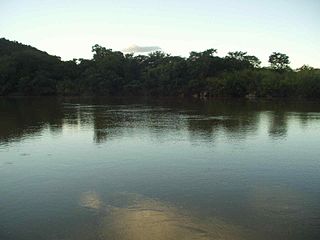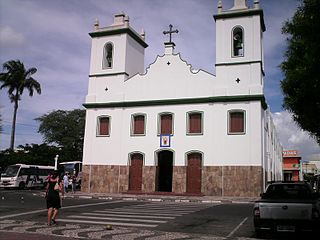Related Research Articles

Bahia is one of the 26 states of Brazil, located in the Northeast Region of the country. It is the fourth-largest Brazilian state by population and the 5th-largest by area. Bahia's capital is the city of Salvador, on a spit of land separating the Bay of All Saints from the Atlantic. Once a monarchial stronghold dominated by agricultural, slaving, and ranching interests, Bahia is now a predominantly working-class industrial and agricultural state. The state is home to 7% of the Brazilian population and produces 4.2% of the country's GDP.

The Estádio Fonte Nova, also known as Estádio Octávio Mangabeira, was a football stadium inaugurated on January 28, 1951 in Salvador, Bahia, with a maximum capacity of 66,080 people. The stadium was owned by the Bahia government, and was the home stadium of Esporte Clube Bahia and Esporte Clube Vitória. Its formal name honors Octávio Cavalcanti Mangabeira (1886–1960), a civil engineer, journalist, and former Bahia state governor from 1947 to 1954.
Serra Dourada is a municipality in the Brazilian state of Bahia. In 2020, the estimated population was 17,321.

The Paranã River is located in Goiás and Tocantins states, Brazil. It divides two regions - the Northeast and north-central Goiás. It is formed by tributaries that descend the Serra Geral, the mountains that divide eastern Goiás and Bahia. One of the most important tributaries is the Crixás, which has its source near Formosa. Farther to the north the Paranã becomes the main tributary of the Tocantins River on the right bank. Today it is crossed by a long concrete bridge between the municipalities of Iaciara and Nova Roma. It forms the valley which makes up a vast region called the Vão do Paranã Microregion.

Jordânia is a Brazilian municipality located in the northeast of the state of Minas Gerais. The city belongs to the mesoregion of Jequitinhonha and to the microregion of Almenara. As of 2020 the population was 10,842 in a total area of 549 km².

Santa Maria do Salto is a municipality in the northeast of the Brazilian state of Minas Gerais. Its population in 2020 was 5,217 inhabitants in a total area of 442 km2.

Bahia Falls is a waterfall on the Santo Antônio River, in city of Santo Antônio do Rio Abaixo, in the state of Minas Gerais in Brazil. It has about 4 m (13 ft) of height.

The Carinhanha River is a river of Bahia and Minas Gerais states in eastern Brazil.
The Gavião River is a river of Bahia state in eastern Brazil.
The Gongogi River is a river of Bahia state in eastern Brazil. It flows through the municipalities of Gongogi, Nova Canaã, Iguaí, and Itagibá. It empties into the De Contas River
The Saracura River is a river of Bahia state in eastern Brazil.

Bahia was the lead ship of a two-vessel class of cruisers built for Brazil by the British company Armstrong Whitworth. Crewmen mutinied in November 1910 aboard Bahia, Deodoro, Minas Geraes, and São Paulo, beginning the four-day Revolta da Chibata. Brazil's capital city of Rio de Janeiro was held hostage by the possibility of a naval bombardment, leading the government to give in to the rebel demands which included the abolition of flogging in the navy. During the First World War, Bahia and its sister ship Rio Grande do Sul were assigned to the Divisão Naval em Operações de Guerra, the Brazilian Navy's main contribution in that conflict. The squadron was based in Sierra Leone and Dakar and escorted convoys through an area believed to be heavily patrolled by U-boats.
Iaçu is a municipality in the state of Bahia in the North-East region of Brazil.

Senhor do Bonfim is a municipality in the state of Bahia in the North-East region of Brazil.
Lajedo do Tabocal is a municipality in the state of Bahia in the North-East region of Brazil.
Wanderley is a municipality in the state of Bahia in the North-East region of Brazil. It has a population of roughly 12000 people. It is very dependent on the agricultural industry in the region with a large portion of the people owning cattle. In the centre of the city there is a church, a market, and an abandoned gas station. It is approximately 2 hours from the main city in the region, Barreiras, and eleven hours driving from the capital of the state Bahia, Salvador. It also 9 hours from the Brazilian capital, Significant Points There are several significant points in Wanderley.
•Praca Do Milho •Panificadora E Mercearia Central
Sapeaçu is a municipality in the state of Bahia in the North-East region of Brazil.

Sítio do Quinto is a municipality in the state of Bahia in the North-East region of Brazil.
The Paraguayan Navy is the maritime force of the Armed Forces of Paraguay, in charge of the defense of Paraguay's waters despite not having direct access to the sea.

Serra do Ramalho is a municipality in the state of Bahia in the North-East region of Brazil.
References
Coordinates: 12°11′S43°13′W / 12.183°S 43.217°W